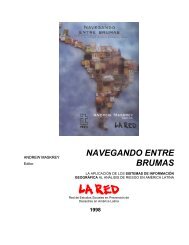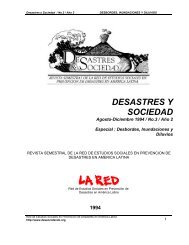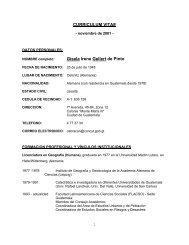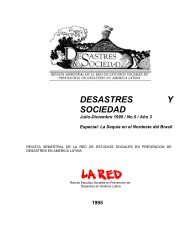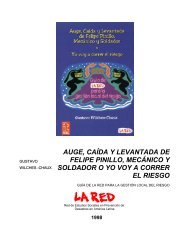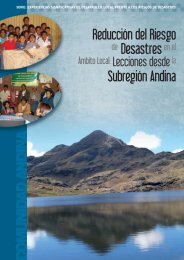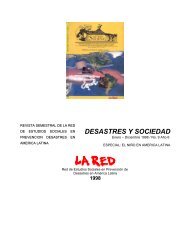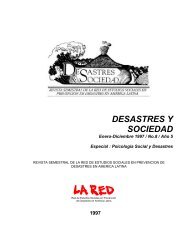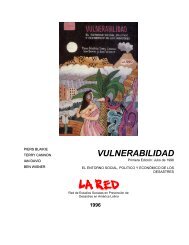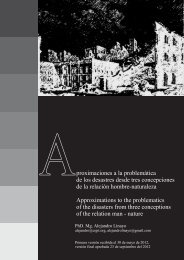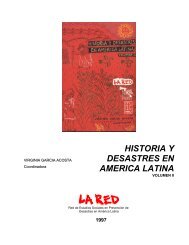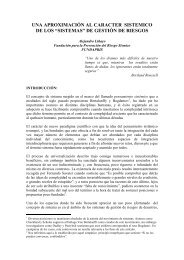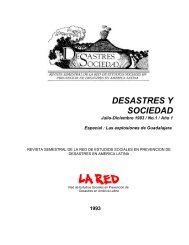Estrategias sociales de prevención y adaptación Social ... - La RED
Estrategias sociales de prevención y adaptación Social ... - La RED
Estrategias sociales de prevención y adaptación Social ... - La RED
Create successful ePaper yourself
Turn your PDF publications into a flip-book with our unique Google optimized e-Paper software.
Calvinism was a force for land reclamation in the Netherlands. Unlike Luther, Calvin<br />
was in favour of merchants, urging them not to hoard but reinvest their profits. Interestingly,<br />
the river Purmer was laid dry in 1622 backed by counter reformist investors.<br />
Religious opposition to water policies remains today. The recent “horizontalisation”,<br />
that is, the drive for <strong>de</strong>mocratisation and naturalisation of water management therefore was<br />
not necessarily applau<strong>de</strong>d by farmers, especially when the EU turned farmers into nature<br />
stewards. Orthodox Calvinists however frequently resisted this felt they were there to make<br />
the Earth productive. For orthodox Christians confronted by “Making Space for the River”<br />
projects such as the interventions on the river Waal at Druten, stewardship of the land<br />
means tilling it, not leaving it to nature (interview, van Vuuren, 2008).<br />
What about the role of non-religious local knowledge and beliefs Several ol<strong>de</strong>r citizens<br />
in riversi<strong>de</strong> areas still go by the signs of nature and the memory of earlier floods, and have<br />
repeatedly beaten the “experts” on <strong>de</strong>tail. “I never heard the dikes groan but now I do”, a<br />
lady from Druten said (van Meurs, 1995). The people are not always right though: the examples<br />
from interviews conducted after the 1995 high-water event by van Meurs, a critical journalist,<br />
show that people’s local knowledge can be rather hit and miss.<br />
One would expect local knowledge to be <strong>de</strong>ployed to counter expert knowledge in resisting<br />
spatial interventions, but in cases we researched, it proved more effective and expedient<br />
not to. An interesting finding from different projects however (Warner, Roth and Winnubst,<br />
2006; Warner, 2010) is that communities also gain access to expert knowledge to make their<br />
point. In the context of the European-fun<strong>de</strong>d Freu<strong>de</strong> am Fluss project, the local platforms I<br />
came across in the Netherlands, Germany and France were almost invariably led by (semi-)<br />
retired professionals with a lot of time on their hands and a very good social network,<br />
through which they find counter-expertise, shooting holes in official mo<strong>de</strong>ls and reports, or<br />
fighting the numbers with other numbers (e.g. Zutphen, Ooij, Cologne, Brehemont).<br />
Farmers meanwhile find ways of liaising with farmers elsewhere to exchange professional<br />
reports and strategies.<br />
Resuscitating Established Institution: Water Boards. Monasteries and farmers <strong>de</strong>veloped<br />
technologies for reclaiming 3 more and more land at the end of the first Millennium A.D.<br />
<strong>La</strong>ndowners gave floodable land to monks. Monks at that time were the only social group<br />
with enough time and education to study technology. This laid the foundation for the thousands<br />
of famed water management boards <strong>de</strong>veloping around the 12th and 13th century.<br />
The water boards bring together farmers to arrange for flood <strong>de</strong>fence and regulate drainage.<br />
Depen<strong>de</strong>nce on the cooperation of everyone is believed to have fostered a fondness for consensus-building<br />
and tolerance of minorities. Reclamation increased the number of water<br />
boards from 2000 to 2500 between 1900 and 1950. Sometimes a single her<strong>de</strong>r would build a<br />
sluice and be the director and technical service of a water board (IJff, 1993). While often<br />
presented abroad as a venerable mo<strong>de</strong>l of <strong>de</strong>mocracy, the water boards were far from egali-<br />
3<br />
“Reclaiming” itself of course is a mo<strong>de</strong>rnist term suggesting something needs to be claimed back from the sea<br />
that was yours all the while.<br />
33



